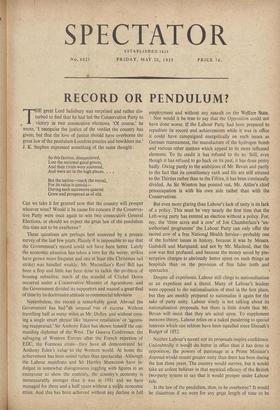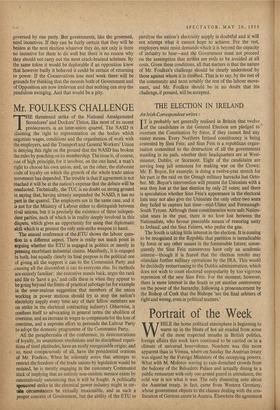RECORD OR PENDULUM?
THE great Lord Salisbury was surprised and rather dis- turbed to find that he had led the Conservative Party to victory in two consecutive elections. 'Of course.' he i• wrote, 'I recognise the justice of the verdict the country has given; but that the love of justice should have overborne the great law of the pendulum 1 confess puzzles and bewilders me.' .1. K: Stephen expressed something of the same thought : So this faction, disappointed, Lost the national good graces, And their rivals were anointed, And were set in the high places. . But the nation—mark the moral, For its value is untold—
During each successive quarrel Grew and prospered as of old.
Can we take it for granted now that the country will prosper whoever wins? Would it be cause for concern if the Conserva- tive Party were once again to win two consecutive General Elections, or should we expect the great law of the pendulum this time not to be overborne?
These questions are perhaps best answered by a prosaic survey of the last few years. Plainly it is impossible to say that the Government's record could not have been better. Lately the economic situation has taken a turn for the worse; strikes have grown more frequent and one at least (the Christmas rail strike) was handled weakly; Mr. Macmillan's Rent' Bill has been a flop and little has been done to tackle the problem of housing subsidies; much of the scandal of Crichel Down occurred under a Conservative Minister of Agriculture; and the Government divided its supporters and wasted a great deal of time by its doctrinaire attitude to commercial television Nevertheless, the record is remarkably good. Abroad the Government has haeat unusual'run of success Without travelling half as many miles as Mr. Dulles. and without coin- ing a single smart phrase like 'massive retaliation' or 'agonis- ing reappraisal,' Sir Anthony Eden has shown himself the out- standing diplomat of the West. The. Geneva Conference, the salvaging of Western Europe after the French rejection of EDC, the Formosa crisis—they have all delnonstrated Sir Anthony Eden's value to. the Western world. At home the achievement has been sound rather than spectacular. Although the Labour manifesto and Sir Hartley Shawcrois have in- dulged in somewhat disingenuous juggling with figures in an endeavour to show the contrary, the country's economy is immeasurably stronger than it was in 1951 and we have managed for three and a half years without a single economic crisis. And this has been achieved without any decline in full employment and without any assault on the Welfare State.
Nor would it be true to say that the Opposition could not have done worse. If the Labour Party had been prepared to repudiate its record and achievements while it was in office it could have campaigned energetically on such issues as German rearmament, the manufacture of the hydrogen bomb and various other matters which appeal to its more inflamed elements. To its credit it has refused to do so. Still, even though it has refused to go back on its past, it has done pretty badly. Owing partly to the ambitions of Mr. Bevan and partly to the fact that its constituency rank and file are still attuned to the Thirties rather than to the Fifties, it has been continually divided. As Sir Winston has pointed out, Mr. Attlee's chief preoccupation is with his own side rather than with the Conservatives.
But even more glaring than Labour's lack of unity is its lack of a policy.. This must be very nearly the first time that the Left-wing party has entered an election without a policy. For, say, the 'three acres and a cow' of Joe Chamberlain's 'un- authorised programme' the Labour Party can only offer the sacred cow of a free Nationil Health Service—probably one of the feeblest issues in history, because it was by Messrs. Gaitskell and Marquand, and not by Mr. Macleod, that the cow was first profaned, and because the money saved by pre- scription charges is obviously better spent on such ttings as hospitals than on the provision of free false teeth and spectacles.
• Despite all experience, Labour still clings to nationalisation as an expedient and a threat. Many of Labour's leaders were opposed to the nationalisation of steel in the first place, but they are meekly prepared to nationalise it again for the sake of party unity. Labour wisely is not talking about its nationalisation proposals. but there is little doubt that Mr. Bevan will insist that they are acted upon. To supplement outworn theory, Labour relies on a naked pandering to special interests which can seldom have been equalled since Disraeli's Budget of 1852.
Neither Labour's record nor its proposals inspire confidence. Undoubtedly it would do better in office than it has done in opposition; the powers of patronage at a Prime Minister's disposal would ensure greater unity than there has been during the last three years., The country would survive, but it would take an ardent believer in that mystical efficacy of the British two-party system to say that it would prosper under Labour rule.
Is the law of the pendulum, then, to be overborne? It would be disastrous if we were for any great length of time to be governed by one party. But governments, like the governed. need incentives. If they can be fairly certain that they will be beaten at the next election whatever they do, not only is there no incentive for them to do well but there is no reason why they should not carry out the most crack-brained schemes. By the same token it would be deplorable if an opposition knew that however badly it behaved it could be certain of returning to power. If the Conservatives lose next week there will be grounds for thinking that the records both of Government and of Opposition are now irrelevant and that nothing can stop the pendulum swinging. And that would be a pity.











































 Previous page
Previous page